Choosing the right type of flooring for your bathroom might appear to be a simple job. Most homeowners might think the bathroom should carry the same flooring as other house parts. The end result, however, will be a bathroom floor that is unable to handle the stress and is damaged by moisture after a while.
Flooring in other parts of the home is chosen based on its appearance and durability. But for bathroom flooring, the game is entirely different. The first consideration is the performance, and by the performance, I mean how it handles frequent moisture and splashes. The second consideration is how the flooring handles changes in temperature and humidity.
No worries. I’ll introduce you to some of the best flooring materials, along with their pros and cons, to help you choose the best one for your bathroom.
Best Bathroom Flooring Types
1. Ceramic or Porcelain Tiles
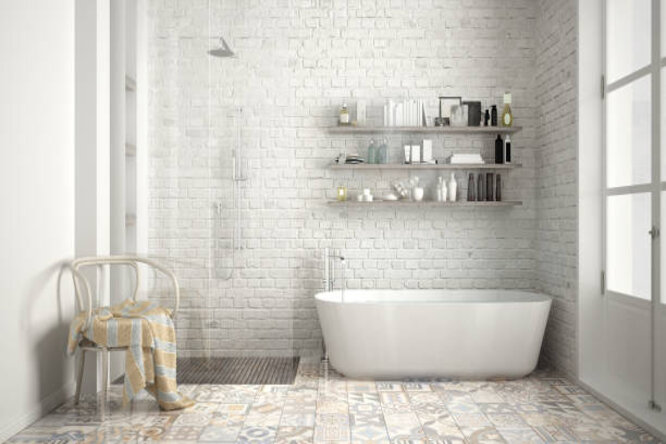
For a long time, ceramic or porcelain tiles have been the best option for flooring bathrooms. With various styles made readily available, ceramic tiles or planks are durable, waterproof, easy to maintain, and stain-resistant.
Pros
- Available in different colors, shapes, and sizes
- Works well with radiant floor heating
- Easy to maintain
- Increased home resale value
Cons
- Not all ceramic tile is slip-resistant. To avoid slip and fall, it is advised to go for tiles that are certified slip-resistant
- Tricky to install, even for professionals
2. Vinyl or Linoleum Bathroom Flooring
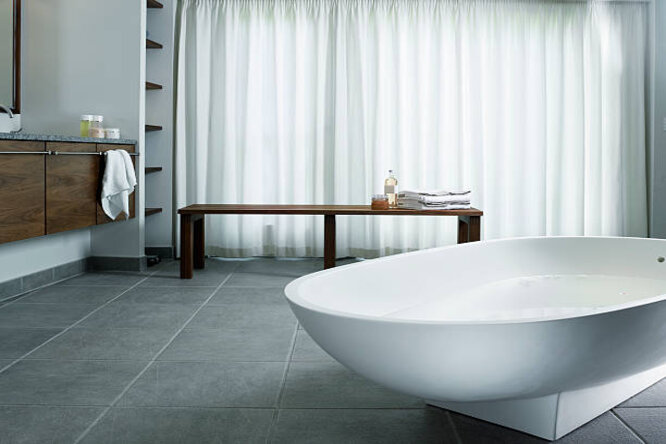
Vinyl or Linoleum flooring has been a popular choice for decades because this type of flooring has a lot going for it. Easy to clean, waterproof, stainproof, and most importantly, budget-friendly. What’s more, it is one of the easiest types of bathroom flooring to install and comes in many colors and patterns, even mimicking stone and wood.
Pros
- Budget-friendly
- Versatile
- Easy to install
- Easy to replace
- Waterproof
Cons
- It won’t add much to the resale value of your home
- Bumps, curls, and other irregularities will show through
- Difficult to repair
3. Waterproof Laminate
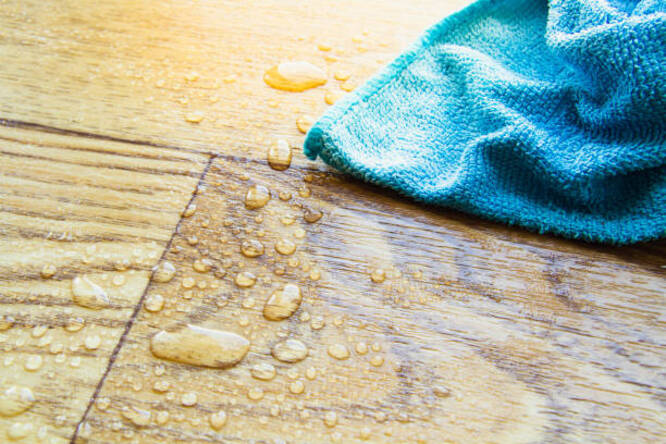
Often mistaken as Vinyl flooring due to their many similarities, waterproof laminate is also another superb type of flooring. Aside from being inexpensive, waterproof flooring is also easy to install, is durable, and looks pretty much like the real deal.
Pros
- Inexpensive
- Easy to install
- Comes in a wide range of realistic wood patterns and colors
- Resistant to scratches and stains
Cons
- In the long run, you may find that water doesn’t play well with this flooring if left too long. It may eventually swell or distort
4. Concrete
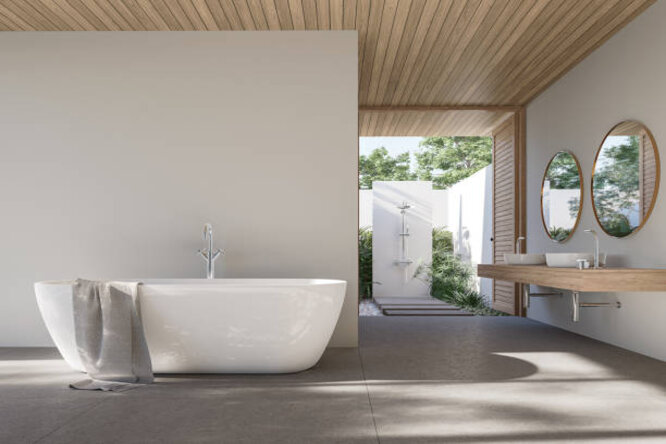
Concrete is such a versatile product that it is used for a number of construction projects. Floors made of concrete are common in homes with slab foundations and carry a number of advantages over other materials.
Pros
- Considering how long concrete lasts, it can prove to be a very cost-effective option
- Can be sealed
- Can be colored or painted
- Resistant to a huge range of bathroom travesties
Cons
- Concrete can be cold and hard to the touch
- Slippery if finished with a smooth surface
- It may require fill-work in case of a crack, which is messy and unpleasant
5. Natural Stone
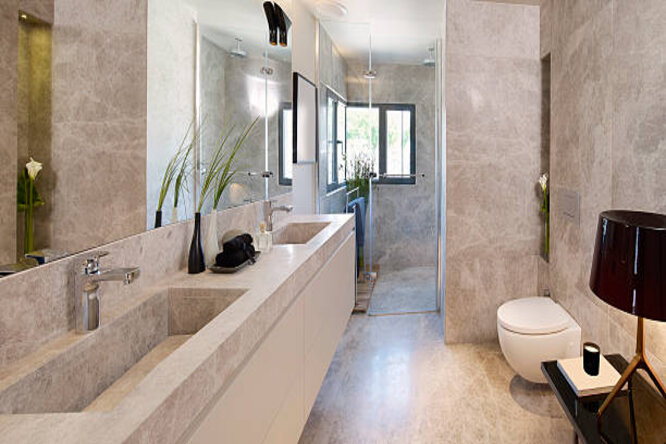
There are only a few types of bathroom flooring materials that offer a more luxurious or appealing look. Any type of natural stone, whether marble, granite, or limestone, can be expensive. It can also be cold and slippery, but it positively affects the resale value of your home.
Pros
- Very durable
- Gives your bathroom an unmatched beauty
- Increases the resale value of your home
Cons
- Both the purchase and installation can weigh heavily on your budget
- Prone to water damage if not sealed
- Difficult to install
6. Cork Flooring
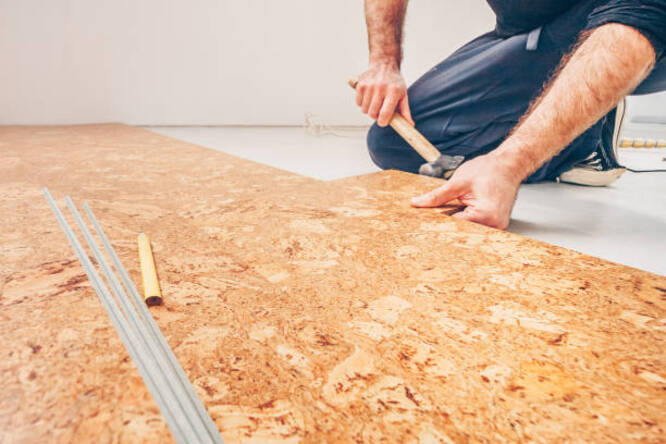
Cork flooring is made from bark, and although it is not as common as ceramic and porcelain tiles, it is environmentally friendly and sustainable. It is a very porous material, so for bathroom flooring, it will have to be sealed once every few years to protect it from moisture.
Pros
- Made from renewable sources, making it environmentally friendly
- Provides natural warmth and a pleasant texture
- Mold and mildew-resistant
Cons
- Requires regular maintenance
- Expensive
- Tricky installation
7. Bamboo (Engineered Bamboo)
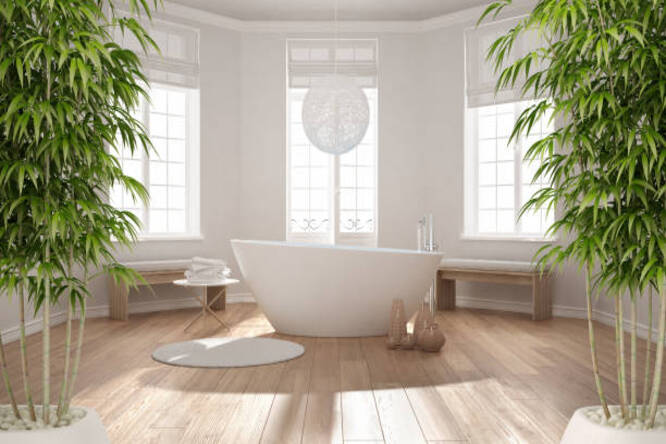
Bamboo is another environmentally friendly choice for bathroom flooring to try. The recommended type of bamboo for the bathroom floor is engineered bamboo. This is because engineered bamboo planks are extremely durable and ideal for wet environments such as the bathroom.
Pros
- Easy to install
- Easy to repair if damaged
- Eco-friendly
- Unique visual appeal
Cons
- Prone to scratch
- Colors and designs are a bit limited
- Not fully waterproof
FAQs
Which flooring material is the best for bathrooms?
Ceramic and porcelain tiles are considered the best type of flooring material for bathrooms because they are durable, waterproof, easy to maintain, stain-resistant, and fairly affordable.
Which is the most durable flooring for bathrooms?
In terms of durability, natural stone, if maintained properly, can last a lifetime.
What is the cheapest flooring for bathrooms?
Talking prize, vinyl flooring is the most budget-friendly option.
Conclusion – Choosing The Best Among Various Flooring Types
Choosing the right or ideal flooring for your bathroom has to be looked at from various perspectives. While many homeowners go for vinyl flooring, which is a very budget-friendly choice, you must consider other key aspects before deciding.
If you prioritize lifespan, then natural stone will be the right choice for you as they can last a lifetime if maintained adequately. But if you want to strike a balance between durability, cost, aesthetics, and usage, ceramic and porcelain flooring will be the best choice.
Want to commence your bathroom flooring project? Samkins Constructions is the one for you. With years of experience, we pride ourselves on giving customers the best. Get in touch with us today!!!
Thanks for reading.